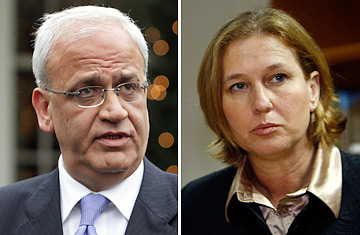
Palestinian Chief Negotiator Saeb Erekat (left) and Israeli Foreign Minister Tzipi Livni,
The Israeli-Palestinian peace negotiations launched at the upbeat Annapolis summit last month got off to a rocky start on Wednesday, as Palestinian officials complained about Israel's military raid into Gaza on the eve of the talks. The Palestinians were also aggrieved by the failure of Israeli Prime Minister Ehud Olmert to freeze construction work on a new Jewish settlement in East Jerusalem.
Palestinian Chief Negotiator Saeb Erekat reportedly told the Israeli team, led by Foreign Minister Tzipi Livni, "Either you choose a path of settlement and incursion [into Gaza] and business as usual, or you choose peace." Israel's present course of action, Erekat warned, is "destroying us." Israeli envoys described the atmosphere at the Jerusalem talks, the first formal negotiations between the two sides since early 2001, as "tense." Clearly dissatisfied with the Israelis' response to his envoy's complaints, Palestinian Authority President Mahmoud Abbas on Thursday journeyed to Amman to enlist the help of Jordan's King Abdullah in persuading the Bush Administration to pressure Olmert into halting work on the controversial East Jerusalem settlement known as Har Homa.
Washington may not need much nudging: Earlier, U.S. Secretary of State Condoleezza Rice had taken the rare step (for the Bush Administration) of criticizing Israel, saying that Olmert's failure to halt the Har Homa construction was "unhelpful" to the Annapolis peace process, which aims to set up a Palestinian state by 2009 — a state whose capital the Palestinians insist must be East Jerusalem. Still, Olmert may be hamstrung by his right-wing coalition partners, who are threatening to topple him if he freezes work on Har Homa and other settlements as required by the Annapolis .
Abbas, of course, has domestic problems of his own. Not all Palestinians are in favor of the U.S.-sponsored peace talks with Israel. Islamic militants of Hamas, who seized Gaza from Abbas' forces in June, opposed Annapolis outright, and urged Abbas to boycott Wednesday's talks. And despite his feud with Hamas, Abbas found it harder to sell the new peace process to Palestinians in the midst of a new assault on Gaza in which three Palestinian militants were killed by an Israeli air strike and two Israeli soldiers were wounded when a grenade struck their tank.
The Israeli offensive aimed to thwart Palestinians from firing rockets into southern Israel, but militants responded by firing more than 20 rockets into the Israeli town of Sderot, prompting the mayor to quit in anger over the government's failure to shield residents from repeated attack. Some Israelis commentators suggest that the latest offensive may be a prelude to a major offensive in Gaza. Warned Israeli Chief of Staff Lt. Gen. Gabi Ashkenazi, "The situation in Gaza can't continue for long It is possible that we will reach a point at which we need to carry out the large-scale operation." The Israeli military has refrained from re-capturing Gaza, knowing that it might entail extensive casualties among the enclave's 1.4 million Palestinian civilians, and among Israeli troops. As one Israeli ex-general and security expert, Zvi Staube, head of the Institute for National Security Studies in Tel Aviv, suggested, "It's easy getting into Gaza; getting out is the hard part."
Among the probable casualties of a major Israeli offensive in Gaza would be the talks started in Jerusalem on Wednesday, because it would likely force President Abbas to walk away from further negotiations with the Israelis. Senior officials within Abbas's Fatah movement told TIME that Abbas and his top negotiators now fear assassination — not by Hamas, but by radicals within the president's own militia, who are angry with him for supposedly giving too much away to the Israelis and getting too little in return.
— With reporting by Jamil Hamad/Ramallah
